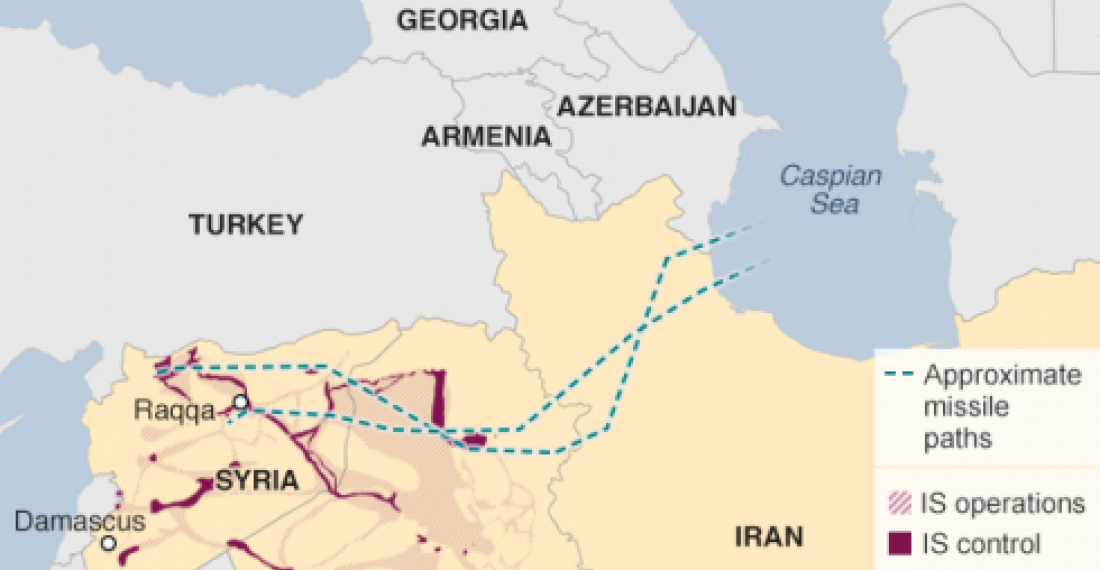This is a commentary prepared by the editorial team of commonspace.eu.
On Wednesday, Russia said it had fired 26 missiles at 11 targets in north and north-west Syria. The missiles were fired from ships of Russia's Caspian Flotilla about 1,500km (930 miles) away. On Thursday, Russia reiterated that all the rockets hit their targets, despite the fact that American sources insist that four of the missiles fell on Iranian territory.
Russia's decision to throw its full military weight behind the government of Syrian President Basher al Assad has irritated western countries, as well as many Arab states who have in the past five years put in considerable effort to try to topple the Baathist regime in Damascus. Ostensibly Russia has intervened in Syria in order to attack the forces of the so-called "Islamic State" (ISIL) which it sees as also being a long term threat to its own security. Fighters from the North Caucasus are reported to be among the most efficient of the ISIL warriors, and there is fear that they will soon return home to continue their jihad in the North Caucasus. However it became obvious from the very first day of the operation that the Russian objectives in Syria were far from limited to striking ISIL. Russia's neo-imperial ambitions have now reached the shores of the Mediterranean. The choice to use the Caspian Flotilla for the missile strikes is also not a coincidence. It connects the Caspian and the East Mediterranean theatres of operation in a most dramatic fashion. It sends a message to the countries in between that they should not stand in the way.
There are many reasons why the Caspian Region, the Black Sea Region, the East Mediterranean and the Gulf region can be seen as part of a larger super region. Indeed the economic potential of this super region, if it is able to develop peacefully,is enormous. The countries of the South Caucasus - Armenia, Azerbaijan and Georgia, are at the heart of this super region and can contribute much to it, and in turn benefit immensely. Unfortunately this super-region is riddled with conflicts, some like in Syria, very much alive, others like the Karabakh conflict simmering and ready to erupt. Entangling the Caspian with the conflict in Syria is the last thing the region needed. By doing so the Russian government has once more shown that it will stop at nothing in the process of achieving its neo-imperial ambitions. The incidents between Russian forces on Turkey's borders with Syria further add to the tensions in the region. NATO has taken these incidents very seriously and has made clear its commitment to Turkey as a long time ally and member of the alliance. NATO, which in the immediate aftermath of the end of the cold-war, had become a rather sleepy organisation, has already had to step-up significantly in the last two years following events in Ukraine. The situation on the south-east borders of the alliance now introduces a new sense of urgency.
Military solutions offer no long term way out, for the problems in Syria, in Nagorno-Karabakh nor elsewhere. Countries, be they global or regional powers, or small states, must come together in dialogue to address both the immediate challenges as well as the core issues that underpin them. The rule of law must return to international relations as the basis from which the current crises can start being addressed. The time for a piecemeal approach is over. While each situation has its own dynamics and specificities there are clearly bigger issues at play, with an impact way beyond the immediate location of the ongoing conflicts. In the same way that NATO has stepped-up its military role, other international organisations whose mandate it is to solve problems peacefully need to do likewise. As must the European Union on whose immediate borders conflicts are raging with increased consequences. Governments have a duty to help bring this about, but civil society needs also to break out of its complacency. We are in a period of grave danger for global peace. Locally, regionally and globally, the voices of reason need to be heard before it is too late.
source: This commentary was prepared by the editorial team of commonspace.eu.
photo: The trajectory of the missiles fired from Russia's Caspian Flotilla at targets in Syria on Wednesday, 7 October 2015. (Image courtesy of the BBC).







